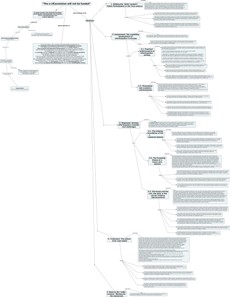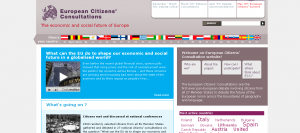A secretly-negotiated deal to protect intellectual property would always be something for the net community to get worked up about. Following the signature of the treaty, only MEPs can block it. They are the targets of an Avaaz petition, which has just rolled over the million mark at the time of writing, imploring them not to let it through.
ACTA is an international treaty aimed at preventing trade in counterfeit goods, with implications for alleged copyright infringements on the internet. The treaty, which has attracted controversy because it was negotiated in private, has been adopted by the EU but still needs formal ratification by the EU Parliament. The provision of ACTA that is most controversial is article 27 (4):
“A Party may provide, in accordance with its laws and regulations, its competent authorities with the authority to order an online service provider to disclose expeditiously to a right holder information sufficient to identify a subscriber whose account was allegedly used for infringement, where that right holder has filed a legally sufficient claim of trademark or copyright or related rights infringement, and where such information is being sought for the purpose of protecting or enforcing those rights.”
In other words, the treaty suggests that signatory countries may want to empower their authorities to force website owners to hand over users’ details, if they are alleged to have used their account for unlawful purposes. As opponents argue, requiring service providers to divulge information about users is problematic for services that encrypt information in a way that means that they themselves cannot access it. It also means that infrastructure is put into place that can be abused for less peaceful purposes such as threatening privacy rights and freedom of expression.
Kader Arif, French MEP and rapporteur for the treaty, resigned as a result of the signing. (In case you’re wondering what a rapporteur is/does: here’s a description.) As reported in the Telegraph, Polish MPs covered their faces with masks from the political hacker group Anonymous and there have been street protests in Poland against the treaty.
Gathering around the hashtag #acta, there are already calls for street protests in other countries including Germany. Between now and June, when the vote in the Parliament is due to be held, we will find out whether net advocates in Europe will come into their own in the same way that they did in the US.
Thanks to Daniel van Lerberghe for this article’s new improved title!
]]>Because this paper needs to be read and, more important, discussed while its analyses are still current.
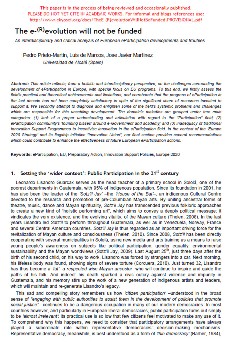 Thus, we have decided to make it provisionally available through PeP-NET. To start such a conversation, what better place than PeP-NET, the Pan European eParticipation network?
Thus, we have decided to make it provisionally available through PeP-NET. To start such a conversation, what better place than PeP-NET, the Pan European eParticipation network? ![]()
We have spent many hundreds of hours researching and writing the paper, as we struggled to make sense of the developments and “under-developments” of eParticipation in the last ten years.
Our appraisal is based on an extensive and interdisciplinary analysis of distinct relevant sources, which included the most recent reports, articles and literature reviews dealing with eParticipation research, practice and theory, as well as projects’ deliverables and evaluations, related databases, and our direct examination of eParticipation systems.
We had to resort to a very varied bunch of disciplines (from history and medicine to Mayan performing arts; seriously!! ![]() ) to be able to achieve a comprehensive understanding of the field’s challenges… and to make a compelling exposition of them.
) to be able to achieve a comprehensive understanding of the field’s challenges… and to make a compelling exposition of them.
The paper ended up being “quite controversial”, as our assessment of eParticipation came to suggest that some of the problems that have hampered its progress have a systemic, overarching character: that kind of ‘elephant in the living room’-issues whose very existence tends to be denied because of their complexity or the embarrassment they cause and, as a result, cannot normally be acknowledged or discussed, let alone get properly sorted out.
Examples of the “embarrassing questions” the paper poses are:
- How can it be that after 10 years… all relevant ‘agendas’ of eParticipation research are still reported as underdeveloped?
- And how can it be that even the most basic questions –for example: the relation of Participation and eParticipation, or the understanding of the dual nature of eParticipaton as something that can be driven by authorities or by citizens themselves– remain unsolved?
- More than 187 millions of Euros were invested in the last ten years to promote experimentation in the field, so… where are the results? Where are the breakthroughs and the research milestones? Can we feel satisfied with just some “vague confirmations” of ideas that 10 years ago could already have been easily guessed?
Through the paper, we have done our best to constructively diagnose eParticipation and to propose some treatments for the field’s maladies. But our perspective and understanding are necessarily limited: the real “treatment” for those problems would require a reflection process that involves the whole eParticipation community.
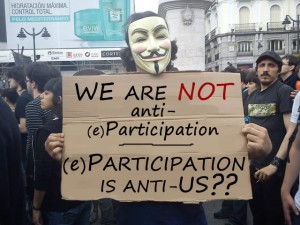 We see this paper as an urgent “call for self-reflection” and consider it a “MUST READ” for anyone involved in European eParticipation: from the officials working at EC’s Directorate for Information society and Media, to the researchers, practitioners, NGOs, public workers, citizen associations… and even any interested European citizen.
We see this paper as an urgent “call for self-reflection” and consider it a “MUST READ” for anyone involved in European eParticipation: from the officials working at EC’s Directorate for Information society and Media, to the researchers, practitioners, NGOs, public workers, citizen associations… and even any interested European citizen.
Therefore, we would like to encourage all our PeP-NET friends and in general all people with interest in eParticipation… to have a look at the paper during this nice summer weekend. ![]()
Anyone who feels “touched” by any of the paper’s claims and argumentations… should speak up and comment to this post. It doesn’t matter if it is to support, extend or complement our asseverations, or to oppose, challenge or further qualify them… please, share your views.
PeP-NET was meant to be a HUB for the conversations around eParticipation. So… let’s discuss. It is important that the issues we showed –be them real or imagined– are talked about, and possibly acted upon.
The environment where we operate is moving. Moving faster and faster. And in the context of the ‘Europe 2020 Strategy’ and its flagship initiative “Innovation Union”, which aims to renew EU’s “Research and Innovation Funding Programmes”, the most important question we need to answer is: “What do we do now??”
For sure, we could keep pretending that there is NO elephant in the living room. Stay in our “academic” Ivory Tower, and just continue doing as we did so far… while we wait for the “barbarians of eParticipation” to arrive, change the democratic landscape by really integrating ICT in governance… and make fools of all us. PeP-NET subscribers included. ![]()
But in our association we want to believe that we, the European eParticipation Community, could do much better than that.
So… no more to say!! Thank you very much for your attention. We hope some of you enjoy reading of our paper and some exchange of ideas can happen afterwards.
—– ADDITION: A CONCEPTUAL MAP SUMMARISING PAPER’S KEY FINDINGS —–
Several people asked for a “summary” version of the paper. Here you have a JPG image (2,5 Mbytes) displaying a Conceptual Map that summarises the paper’s key findings.
I recommend you to save the file first, and then open it with an image editor (like Office Picture Manager) to watch it. It’ll be more easy for you to zoom in and out in the different parts of the image.
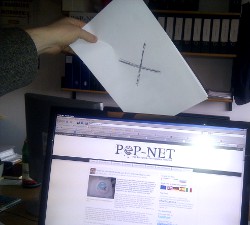
Voting via the internet
The Estonian national elections took place on 6th March, returning the incumbent centre-right coalition to power. As in previous elections, citizens were also able to cast their vote over the internet — this time from 24th February to 2nd March.
The overall election turnout increased only marginally (by less than two percentage points over the last general election) but there was a massive rise in voters who cast their vote on the internet, from 5.5% to 24.3%. This may be partly due to the longer time during which voters could go to the online polls, which increased from three days to seven; but it also suggests an increasing awareness and acceptance of the technology.
As well as voting online, Estonians made use of other online tools to help them decide whom to vote for: the website https://valijakompass.err.ee/, which is a tool that helps voters pick a party according to the policies they agree with, reports over 100,000 hits. (Thanks to Hille Hinsberg for the tip-off!)
You can find a more detailed analysis of the results by Manuel Kripp, Director of the Austrian E-Voting Competence Centre E-Voting.cc, here.
]]>
I vincoli o i limiti delle sperimentazioni hanno spesso a che fare con i gap fra diversi livelli d’azione e possono soffrire di un debole o ambiguo raccordo con le normative. D’altra parte i problemi non sono solo ‘procedurali’, ma si pongono anche sul piano sostanziale: l’esclusione politica dei cittadini corrisponde spesso ad una esclusione sociale e rimanda quindi ai problemi dei contenuti della cittadinanza. Una comprensibile ansia di novità – ‘nuovi’ metodi per partecipare, ‘nuove’ tecnologie applicate alla partecipazione, come nel caso del Web 2.0 – può far dimenticare questi aspetti e può condurre a trascurare sia le opportunità già presenti negli ordinamenti giuridici dei sistemi democratici e forse poco valorizzate, sia i limiti delle sperimentazioni in corso. Allo stesso tempo è necessario tener conto dei caratteri delle culture giuridiche (e politiche) che caratterizzano ciascun paese.
In due dense giornate internazionali di lavoro l’Università di Perugia propone un’occasione preziosa di riflessione e confronto su questi ed altri temi più specifici collegati.
Al link indicato è possibile trovare tutte le indicazioni sull’iniziativa.
“Le Regole della partecipazione. Cultura giuridica e dinamiche istituzionali dei processi partecipativi”.
Università di Perugia, 11-12 Marzo 2010
https://www.unipg.it/convegni/Giurisprudenza-2010/locandina.pdf
Anna Carola Freschi
(Università di Bergamo)
 World’s news agencies join in interactive hub for Copenhagen climate conference!
World’s news agencies join in interactive hub for Copenhagen climate conference!
Eleven international news agencies have launched a joint Facebook page to interact with news consumers across the globe during the United Nations climate conference in Copenhagen.
The Facebook fan page, called The Climate Pool, will bring the news agencies together in an unprecedented collaboration to spark a global conversation about climate issues. The purpose of the Facebook hub (https://www.facebook.com/TheClimatePool) will be to engage readers in direct communication with the world-class journalists covering the U.N. conference Dec 7-18.
Participating are Agence France-Presse, ANP of the Netherlands, The Associated Press, APA of Austria, APcom of Italy, Canadian Press, dpa of Germany, Kyodo of Japan, Lusa of Portugal, Press Association of the United Kingdom and RIA of Russia.
The climate page on Facebook will feature a blog format, providing a behind-the-scenes view of the event and linking out to important coverage of the talks from the agencies and the media outlets they serve. Twitter also will be used to attract followers for the blog and related coverage.
The agencies have come together for the Copenhagen project under the auspices of MINDS International, a global news agency network.
“The climate summit in Copenhagen will affect the lives of billions of people, and it is likely to grip the attention of news consumers all over the world,” said Wolfgang Nedomansky, managing director of MINDS. “The Climate Pool will provide a unique outlet for Internet users to discuss climate change with some of the world’s most experienced journalists covering the conference.”
The Climate Pool page will be produced in English and will incorporate blogposts and multimedia content from the participating agencies, along with links to coverage from around the world.
The Portugese News Agency, Agencia de Noticias de Portugal (LUSA), partner of EMPOWER, an eParticipation Trial Project co-funded by the European Commission under the EU eParticipation Preparatory Action, is a leading force behind this interesting initiative.
The eMPOWER e-Petition platform will serve as an interface between decision-makers at National and European level on one hand and NGOs and citizens on the other hand, while using and testing new forms and methods of civil participation as well as enhancing the role of National News Agencies in promoting and supporting relevant initiatives and ensuring a wider outreach of the project’s results.
]]>After the Obamania that has inflamed the Web, we are still waiting at D-15 for the European Elections 2009 to take-off on the web.
Besides a slow campaign from our political parties in Europe, the European Parliament has decided to launch video campaigns through its YouTube channel (EuropeanParliament channel).
A young blond screaming out her lungs is the new Marianne of Europe on the Web …
The European Parliament of the Youth is not restless as well with a new clip on DayliMotion …
Should our political parties get some inspiration from our European Institutions?
The European Socialist Party is taking on some inspiration, as in its parody of the commercial “MAC versus PC” …
The European Green are coming back in force with Danny the Red (Daniel Cohn-Bendit nickname during the ’68 Revolution) and a “lipdub” (popular type of song in the Web):
Uploaded by EuropeEcologie. – See the latest featured music videos.
Are we going to “lipdub” our way to the voting station?
Are we going to witness an Euromania before June 7?
]]>After an introduction by Olivier Chastel, Belgium Secretary of State for Foreign Affairs, the citizens will present their recommendations and discuss them with:
- Wilfried Martens (EPP)
- Annemie Neyts-Uyttebroeck (ELDR)
- Poul Nyrup Rasmussen (PSE)
- Philippe Lamberts (European Green Party)
- José Manuel Barroso (European Commission)
- Hans-Gert Poettering (European Parliament)
- Mario Sepi (European Economic and Social Committee)
- Luc Van den Brande (Committee of the Regions)
- Alexandr Vondra (Deputy Prime Minister Czech Republic, EU Presidency)
Margot Wallstroem, Vice-President of the European Commission will then make some concluding remarks. The debate will be moderated by Pat Cox, President of the European Movement International.
For details on how to register please see the attachment. You are kindly asked to register by e-mail before Thursday 7th May as places are limited.
For security reasons, only registered participants that received a confirmation e-mail will be allowed to enter.
(How many of you heard about the citizens consultations? And how many of you have been submitting any idea to it, as citizens?)
]]>The project focuses on how new information and communication technologies (ICT) affect the practice of democracy, human rights and the rule of law in Council of Europe member states.
In 2007, the Project had as its main task to compile and analyse examples of good practice on e-voting and e-participation via its experts network and to examine developments on e-democracy/e-participation at European and international level in order to advise the Committee of Ministers on e-democracy’s potential to facilitate democratic reform and practice.
The work is now over, the Parliamentary Assembly has adopted on the 18th of February.

It can be found here: https://xrl.us/behzbh
It is obvious, that the work, which has been going on over 2 years now has involved many experts from the e-democracy field, and has been operated as an intergovernmental body. Further more, it has been also involving other bodies of the Council of Europe’s, such as the Congress for Regional and Local Authorities and the Conference of INGO’s.
In Europe, there is a reference point now, with many strengths, that the different stakeholders could benefit from, when we try to make something understandable.
Although, it is “just”a recommendation, it has large annex and an extremely useful explanatory memorandum.
What does it mean to us? We can make benefit from this document – that is for sure. Since it is a recommendation, it is a bit soft, it is a bit long, but the core points are valuable for many stakeholders, who wishes to introduce e-democracy at most of the levels.
An insider look…
To say a few words on the working methodology and the process – it was not such bright. Participation was mostly low – although, among those, who were present at the meetings was much higher. However, it is never easy to work with the representatives of 49 governments, to negotiate with them, to speak a common language (The secretary was really doing their best.) It is not a surprise, that some of the countries has nearly never shown up, and others were extremely active.
Regarding the working process, the CAHDE was a historical workgroup. Not only because of e-democracy, but because of the participation of the different pillars of the Council of Europe’s bodies, (Although, the civil society and the CRLA was invited to the meetings, voting rights has been not dedicated to the representatives) has not ever given these kind of rights (as far as I know).
This is certainly a good point in an institution, where the inner working processes are not really prepared for e-democratic values, and not following all way around the core pillar of good governance – transparency (I am wondering, if anybody would ask some public information related to this work, what he or she will get). Particularly, the website’s and the services of the different, nowdays mentioned as equal pillars of the COE has not the same possibilities, when it comes to web services. Not event the reimbursment (country representatives could get their daily reimbursment on the meeting day, while the civil society representaitves sometimes had to wait more than a month – maybe it is normal, but not too democratic, and not following the equality – more giving a mirror on the bureocratic dimensions.)
There is obviously an e-democratic deficit in this organization. (See my voluntary findings related to the COE NGO section website revision)
The deficit or imbalance lives it’s embedded life in this monstre institution, since the recommendation does serve the countries, but do not put much pressure to the inner e-democratic development necessities of the organization, which is a bit shame (or 265 kilobyte).
To go a bit further in the developing critiques, the language is really tailored to the governmental spheres and it is not really citizen-ngo friendly-centered.(although, many e-democratic projects are emerging from these pillars). The text misses one of it’s core aims - to relate to every stakeholder in a balanced way.
The toolkit, which is co-made by one of our members in PEP-NET (E-voting.CC) is unfortunately can not speak the language of the NGO’s, which could be not the fault of the writers- it could be more the part of the culture, which does not take into consideration the extreme power, which lies in the third sector, and the empowerment, what this recommendation could provide – if it is pulled out from the authoritarian culture.
But to be honest, this is a progress and a part of our democratic cultural change.
I do think, that a wise application of education of the institutions staff on this topic could give a fresh breeze and more efficient service delivery to the COE. People need the values and tools of e-democracy in many programs, launched by the COE, or it’s institutions, just like the people in Europe.
]]> After the summer TechTools workshop in Prague, organized by Transitions Online, which has gathered many organizations from the CEE region, dealing with transparency issues and the possibilities of new technologies, the second round of the workshop is boundled together with a Barcamp event, in Riga, Latvia in the begining of February, and the CEE CN in proud to participate on this event.
After the summer TechTools workshop in Prague, organized by Transitions Online, which has gathered many organizations from the CEE region, dealing with transparency issues and the possibilities of new technologies, the second round of the workshop is boundled together with a Barcamp event, in Riga, Latvia in the begining of February, and the CEE CN in proud to participate on this event.
Barcamp, is something unique, that connects the virtual communities with the real ones.
Barcamps are about development and sharing, open spaces and techniques, cooperation and co-creation.
“Barcamp is an ad-hoc gathering born from the desire for people to share and learn in an open environment. It is an intense event with discussions, demos and interaction from participants.”
It worths to check at Barcamp.org and to find out more – we do need more Barcamps in Europe!
How about organizing a local, regional E-participationCamp? I do think, that this task does fits PEP-NET schedule and role, that plans to play part in the diverse field of e-participation.
Another Camp sytle is Sicamp - which has an extreme focus on Social Innovation, and organized by Dan McQuillan (internetartizans)
Although, social focus is a trend, but in Canada and in the USA different, democracy related camps are happening. Changecamp and e-democracy camp is something, we have to keep our eyes open, and adapt at the early stages. Camps, are not only succesful forms for development and sharing, but representing the core idea of participation and learning by doing.
]]>
To better understand why the telecom package is criticised in such a fierce manner here are some statements form digital citizens of Europe. Laquadrature.net posted a document containing the most important regulations which will be put into place by the law. It also points out the problematic issues that laquadrature.net think could result from the law. For example it may be that the law would allow the Commission to “impose technical standards on content filtering and monitoring computing so called ‘trusted computing’. The Commission would be able to give the concerned by these regulation recommendations following a quick and undemocratic procedure, at the request of any national regulation authority (ARCEP, CSA, HADOPI in France, OFCOM in the UK, PTS in Sweden).” Another example is that the implementation of “technical measures” to prevent infringement of intellectual property can only be achieved by deep packet inspection or by using spyware on consumers’ computers. Slashdot thinks that the whole Peer-to-Peer infrastructure in Europe may be endangered by this. P2P is used for many legitimate purposes like Skype, the distribution of free and open source software and media content. Following the argumentation of laquarture.net and many others (as for example Members of the European Parliament) the different amendments may be a threat to privacy and freedom of internet users. It may also damage the European economy by hindering innovation.
The final vote on the law will be taken on July 7th (update: it does not seem to totally clear whether the date is final), just one week before the European parliaments summer break. Netzpolitik.org points out that the timing of the decision indicates that those favouring the telecom package do not want to discuss the problematic issues which may be connected to the law. If one takes a look at the huge amount of concerned posts and the intense reactions going on the online community right now there clearly seems to be a demand for discussion of the purposed law. Modern policymaking, especially in a field as complicated and rapidly changing as the internet, should always have a participatory element. Right now we can see that the online community does organize this participation completely by itself and it is up to the involved parties on the policymakers side to pick up the criticism and start a conversation. But considering that the decision will be taken on June 7th it may already be too late for such a productive discourse.
The problem with not involving the stakeholders from the start of the process is not only that a law can not be passed without criticism as we have already seen but also that parts of it may be circumvented and not have an effect at all. The internet is a rapidly changing environment and its users will adapt to new situations as we can see in the PirateBay case. Partly as a reaction to the new surveillance law past in Sweden the websites hosts decided to use SSL encryption on all connections users build up to their servers. This is possible because the use of SSL even on a large scale has gotten cheap both for the needed certificates and the servers handling the encryption work. The decryption of SSL without knowing the needed ciphers is not feasible as connections change very fast and the cipher could easily be made many times stronger than the standard right now. SSL is also an end to end encryption method. Therefore any kind of traffic monitoring without the PirateBays organizers help is impossible. This is an example where technology and new uses of it undermine the power of a law almost completely. It is not to far fetched to assume that a similar thing may happen in the case of the telecom package.
The situation we face right now is a perfect example why we need intense involvement of all stakeholders in the process of law making. The topic at hand could be addressed especially well using eParticipation tools because of its high importance for the internet community and the technical questions related to it. This kind of discourses are still possible as the law has to be adapted on the national levels.
]]>